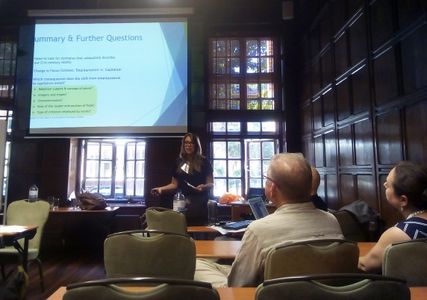CGS Hosts London Conference on Writing and the Nation
On June 30, 2018, an interdisciplinary group of scholars– hailing from colleges and universities in at least seven countries (the US, the UK, France, Ireland, Germany, Malta, and the Netherlands)–convened at Boston University’s Harrington Gardens building, in South Kensington. The gathering was a conference hosted by the Center for Interdisciplinary Teaching & Learning at the College of General Studies, with the support of BU-London, on the topic of “Writing, the State, and the Rise of Neo-Nationalism: Historical Contexts and Contemporary Concerns.”

The conference was organized by CGS Humanities Division faculty members Christopher K. Coffman and E. Thomas Finan. Finan offered a talk, “Motifs of Particularity and Pluralism in American Literature,” and several other BU faculty presented. The CGS Divisional Chair of Humanities, Adam Sweeting, presented a paper entitled “‘I am Almost Glad not to Know Any Law for the Winds’: Thoreau’s Resistance to National Weather Discourse.” Master Lecturer of Rhetoric John Regan chaired a panel on nationalism in 20th- and 21st-century Russia, and BU–London faculty members Andy Charlton and Aleks Sierz chaired panels on contemporary nationalism and New World nationalisms, respectively.
The conference’s keynote speech, “Dylan and the Presidents,” by University of Bristol’s Winterstoke Professor of English Daniel Karlin, offered a serious and engaging look at the criticisms, complications, and celebrations of the American presidency in Bob Dylan’s song lyrics. The Times Literary Supplement published an excerpt of Karlin’s keynote lecture the week after the conference.
Other papers addressed a wide range of subjects, from the relation between prophetic voice in poetry and national identity, to the anti-nationalism of contemporary anarchists in France, neo-Ottomanism in contemporary Turkish political rhetoric, the opportunities opera presents for renewing nationhood, and the nationalist content of contemporary popular music.